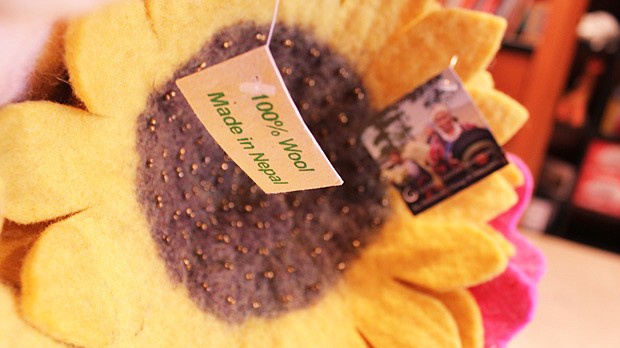- April 25, 2024
-
-
Loading

Loading

At Rollins College, fair trade isn’t just about guilt-free coffee anymore — it’s become a school-wide movement.
And now it’s official: Rollins is the first Florida school to be designated a Fair Trade College through the Fair Trade Colleges and Universities organization.
Ann Francis, the program coordinator for the department of environmental studies and the Sustainability Program, along with interested students, have been working to get the honor during the past year after being inspired by Winter Park’s designation as a Fair Trade Town in 2012.
To achieve the designation, a school’s representatives must make a commitment to purchase fair trade products, create a committee to oversee those businesses that have agreed to participate to make sure they do, make fair trade a part of the curriculum in a range of areas of study, and write up a resolution approved by the school administration stating their plans. Rollins College’s resolution was approved by the Fair Trade Colleges and Universities (FTCU) organization in April.
“Morally, ethically and environmentally there are so many reasons to buy fair trade,” said Rollins student Courtney Banker, who has worked with Francis during the designation process.
The fair trade certifications of today started as a way to protect the human rights of marginalized workers and producers. It’s a response to the failure of conventional trade to deliver sustainable livelihoods that allow workers to invest in their communities to facilitate social development in places of poverty, according to the World Fair Trade Organization.
Not only are fair trade products produced for a fair wage, they are grown and made under safe working conditions in an ethical environment, which means no child or slave labor, no sweatshops. And, a focus on sustainability and the protection and conservation of the environment is required.
“I believe very strongly in environmental stewardship,” said Francis, who’s been working on making Rollins greener since 1999 with her start as a recycling proponent on campus.
Francis said being a Fair Trade College is aligned with the school’s mission to protect the environment.
“That’s really what Rollins is all about, giving back to the world and our community,” said Sandy Todd, executive assistant at the Cornell Fine Arts Museum, where you’ll find many fair trade gifts and jewelry.
At Rollins College the biggest fair trade item — and the most common one sold in the U.S. — is coffee. At the school’s dining facilities and all its catered events, fair trade coffee, tea, chocolate and other food items are served. Along with the spirit of fair trade, Sodexo, the company that manages the school’s dining programs, purchases 10 percent of its produce from local vendors.
“We know the farmers personally; we’ve been to the farms,” said Hernan Gustavo Vasconez, director of operations. “We are committed to make the difference.”
In the bookstore, students can also purchase fair-trade-made Rollins shirts and gear, found next to a sign that says “Changed Lives.”
Francis hopes that she can add more to Rollins’ list of ethical items on campus. She’s researching more food products, and wants to add athletic gear and uniforms if it’s possible in the school’s budget.
The most important mission through the Fair Trade designation, according to Francis and the FTCU, is that fair trade be incorporated into the school’s curriculum, and that through the designation there will be more awareness on campus. They want students to learn what fair trade means, and take a stance in favor of it whenever they can.
“It’s really empowering the farmers and the craftsmen, and it’s empowering the consumer to choose with their dollar,” Banker said. “It’s something that Rollins needs to support, to educate its students and its community.”
“The best impact it’ll make is educating new students coming through,” Francis said. “They’re going to be exposed to things that they didn’t know they may have a passion about.”